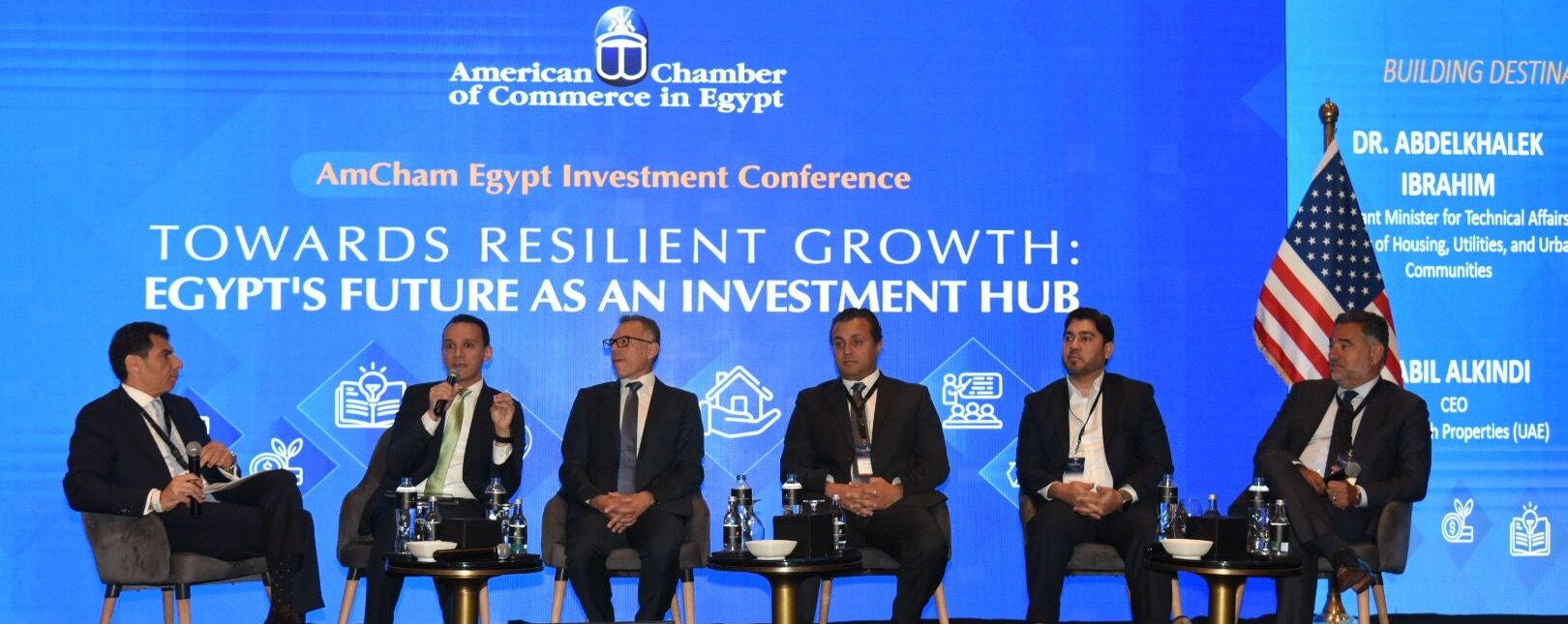The third session of the American Chamber of Commerce (AmCham Egypt) Investment Conference, titled “Building Destinations as Catalysts for Economic Growth”, explored the growing potential of Egypt’s real estate and tourism sectors, with a focus on major government-led projects, private sector involvement, and regional collaboration.
Key figures from both the public and private sectors shared their insights on how strategic investments in new cities like Ras El Hekma can reshape the country’s economic landscape.
A $35B opportunity
The session kicked off with a focus on the groundbreaking Ras El Hekma project, launched by the Egyptian government last year. With a $35 billion investment, the initiative aims to transform the North Coast into a vibrant urban, commercial, and tourism hub. In February, ADQ, an Abu Dhabi-based investment and holding company, acquired development rights for the project, valued at $24 billion, marking a major step in the creation of this state-of-the-art city.
Abdelkhalek Ibrahim, Assistant Minister for Technical Affairs at the Ministry of Housing, Utilities, and Urban Communities, noted that “Egypt’s national strategy 2030 divides the country into economic zones and cities while having two types of cities, national, and international.” He highlighted that key regions such as the Red Sea, North Coast, and the Suez Canal are emerging as prime areas for international investment. “A successful example for drawing international investment is the Ras El-Hekma project in the north coast,” Ibrahim remarked.
Government-private sector partnerships for future growth
Ibrahim also outlined the Egyptian government’s strategy for the development of new cities. While the initial phase focused on public investments, including large-scale projects like the New Alamein, the government is now shifting its approach to fostering stronger partnerships with the private sector.
“The New Urban Communities Authority, a state-owned enterprise affiliated with the Ministry of Housing, now has more than 85 development projects in collaboration with the private sector,” Ibrahim said. This marks a pivotal shift in Egypt’s development model, where public-private partnerships are expected to drive future growth.
The challenge of creating competitive coastal destinations
Shehab El Orabi, General Manager at Modon Developments, discussed the role of coastal projects like Ras El Hekma in enhancing Egypt’s competitive edge, especially against established European destinations like Barcelona. “This would not be an easy mission, as we talk about 170 million square meters of land in Ras El Hekma, this is how large the scale is,” El Orabi explained.
He emphasized that the government’s primary focus is on addressing challenges faced by other destinations within Egypt and overcoming the obstacles encountered when planning new cities. El Orabi stressed that a “master plan” is essential to ensure that new coastal cities are not just seasonal summer destinations but vibrant, year-round communities.
Connectivity: The key to Red Sea success
Ibrahim El Missiri, Co-Chair of AmCham’s Real Estate Committee and Group CEO of Somabay, pointed to connectivity as a critical factor for the success of the Red Sea as a global destination. “The Red Sea wins with its connectivity, airports, and tons of flights,” he said, noting that “we are better connected to Germany than Cairo, as we get 200 flights from Germany per week compared to only 30 from Cairo.”
However, El Missiri also acknowledged the challenges, especially the government’s focus on the region as primarily a tourist destination, rather than as a holistic area encompassing services like education and healthcare. “We are so fragmented in the Red Sea, yet we are all part of one destination. We should come together and establish a cohesive brand,” he added.
Enhancing infrastructure and visa accessibility
Nabil Alkindi, CEO of Dubai South Properties and Managing Director of Studio International Engineering Consultants, spoke on the critical role of infrastructure in positioning Egypt as a hub for international business and tourism. He recommended improvements in airport clearance times and the creation of a flexible e-visa system to attract more visitors.
“Egypt has the necessary infrastructure to become a hub,” Alkindi stated. “We should work on enhancing the clearance time in the airports and facilitate entry procedures by creating a flexible e-visa catering to all nationalities.”
Integrating the Red Sea with regional connectivity
Amr Abdalla A. Attia, Principal at PUD Consultants, highlighted the importance of connectivity in the Red Sea region, specifically pointing to the potential for integration between Egypt’s Red Sea resorts and Saudi Arabia. “A destination cannot work alone; rather, it has to be connected to a global region,” Attia said. “The Red Sea presents a unique opportunity for connectivity, allowing Soma Bay, Gouna, Marsa Alam, and Port Ghalib to connect and integrate with each other, as well as connecting with Saudi Arabia and other facing cities.”
Attia also stressed the importance of localization in differentiating Egypt’s offerings to tourists, residents, and businesses. “We have unique differentiators that can attract tourists, residents, businesses, and talents,” he explained, underlining that localizing the experience will make Egypt stand out in the competitive global tourism market.




